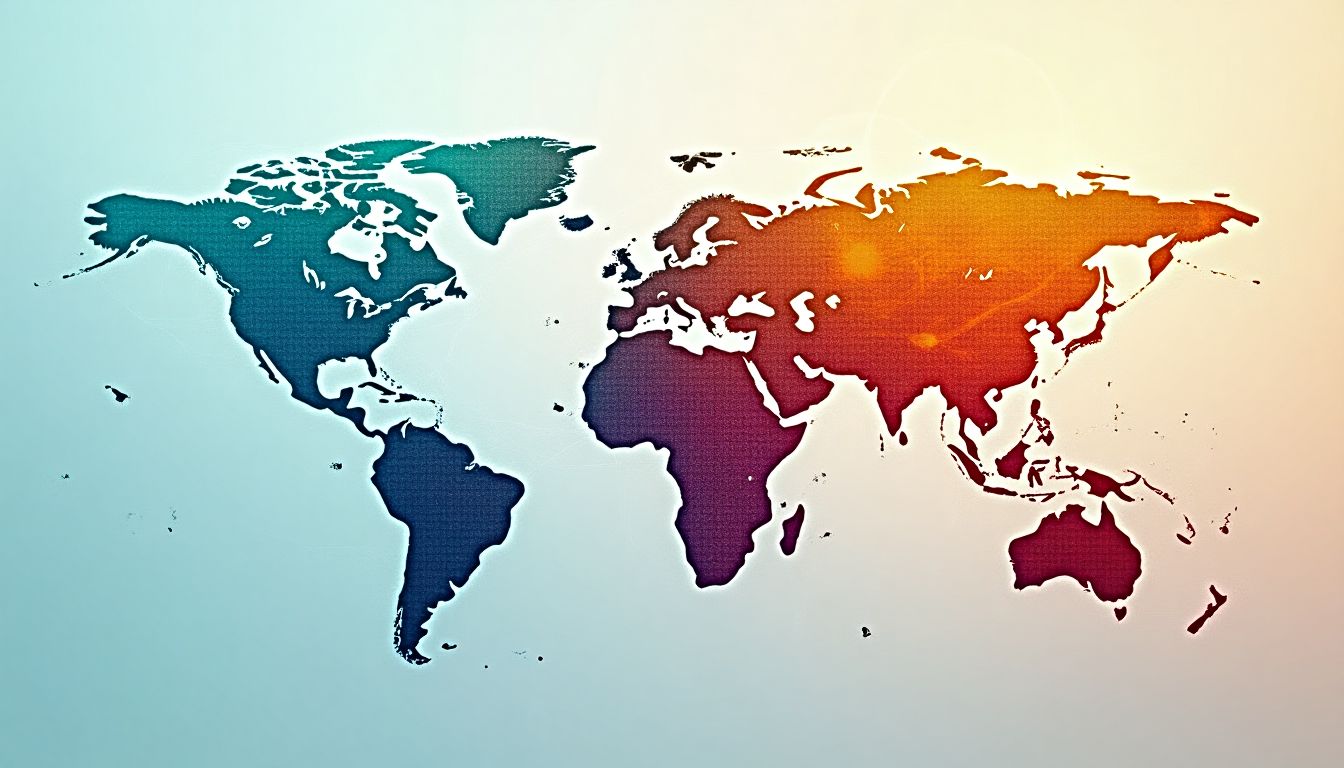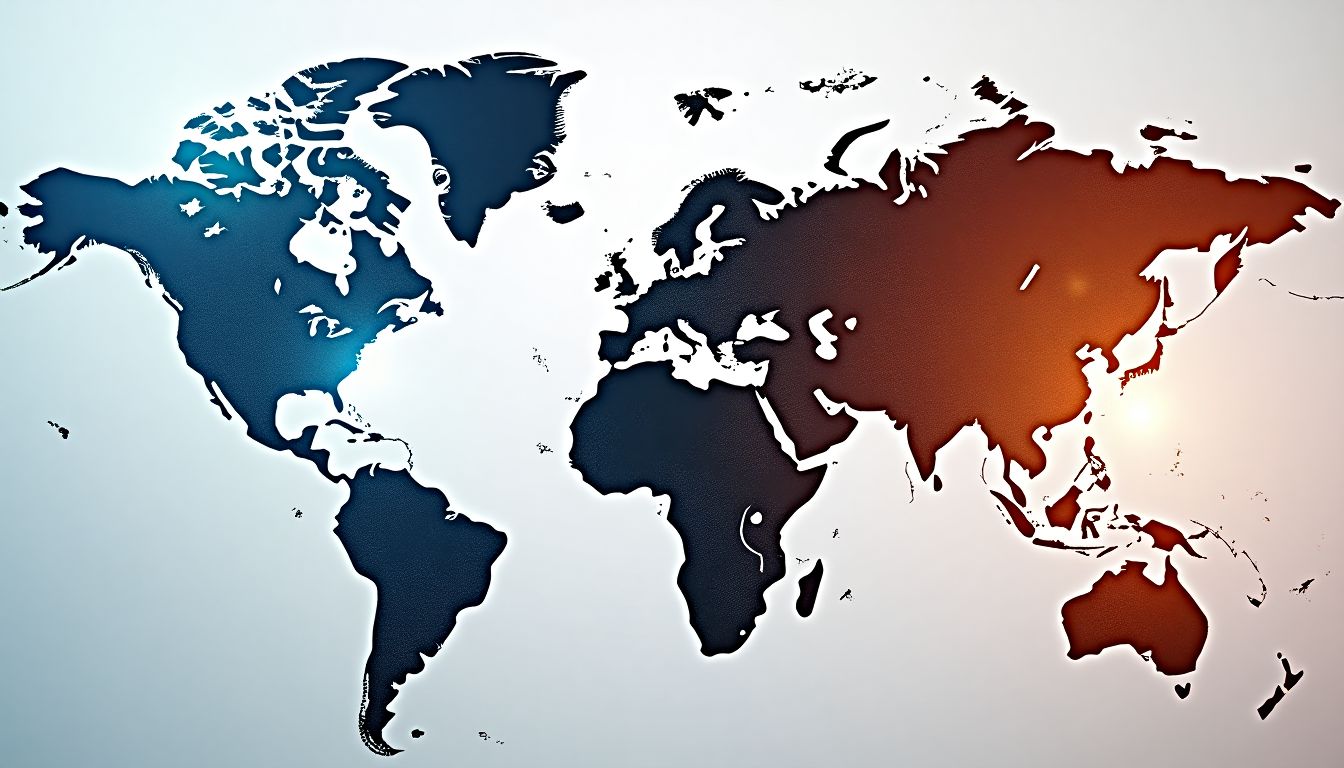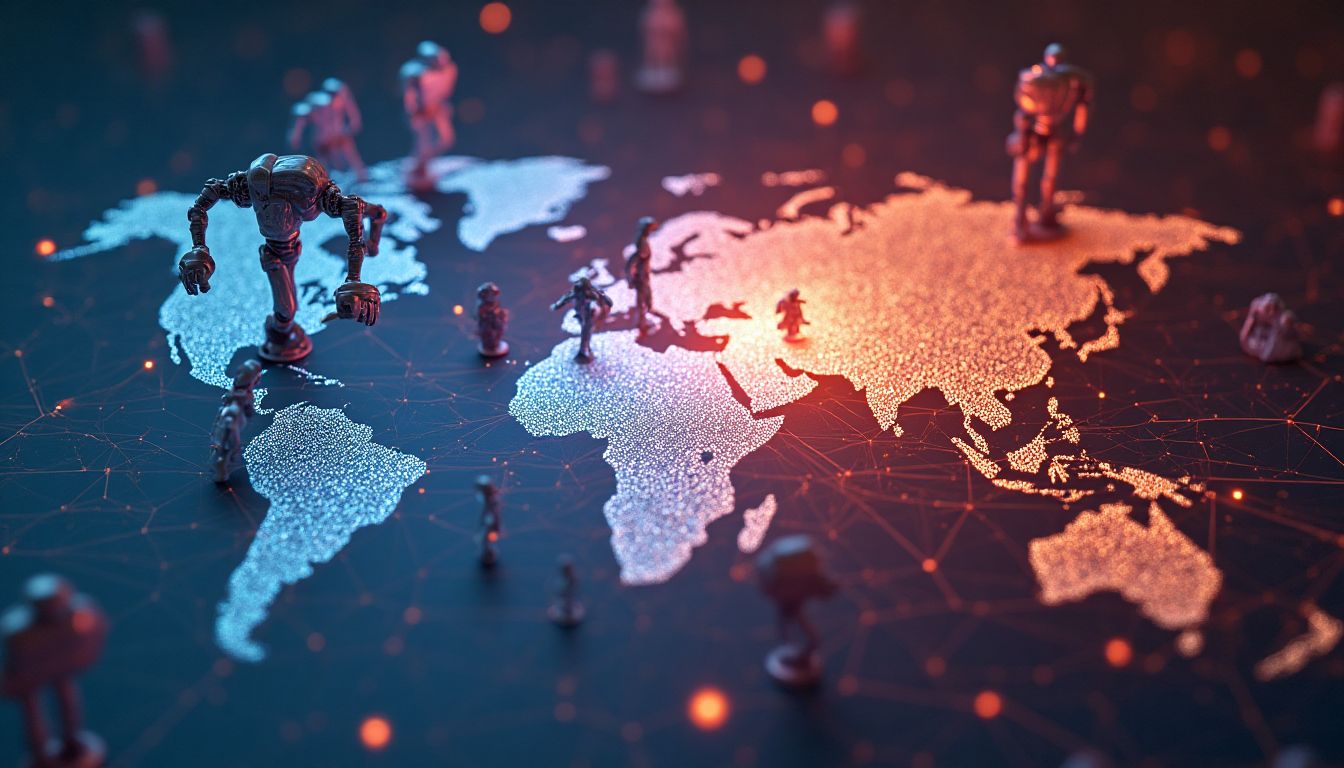Introduction
The unexamined life is not worth living. Socrates might not have known AI, but this insight nudges us to examine the life of technologies we create. Imagine living in a world where machines, not stones, hold the keys to power, economy, and the future of mankind. Today, Artificial Intelligence is redefining the way we think about power and influence. As AI's role on the global stage expands, it reshapes the chessboard of world affairs. The race for AI supremacy among superpowers like the United States, China, and the European Union promises not just fights over technology but a tug-of-war over the future itself.
Will nations bend beneath the immense weight of AI, or soar to new heights because of it? This article explores how the emergence of AI technologies influences international power dynamics, transforming geopolitics and economies in ways that would leave Sun Tzu pondering new strategies. As famous thinkers like Yuval Noah Harari and Elon Musk discuss, the AI era presents opportunities and challenges we must understand if we're to navigate this new reality.
The Geopolitical Landscape: AI as a Strategic Asset
In this fast-paced digital era, countries view AI not just as a tool but as a strategic asset essential for maintaining global dominance. As Albert Einstein once said, “In the middle of difficulty lies opportunity.” In the difficulty of mastering AI, nations see a golden opportunity to strengthen their power and influence.
The Role of AI in National Security
AI's role in national security is immense. Governments integrate AI into defense systems and intelligence networks, using machine learning to anticipate threats before they happen. It’s like having a crystal ball—but made of code and algorithms. America, with billion-dollar initiatives and tech giants like Google and IBM, enhances surveillance and predictive capabilities. Meanwhile, AI is also becoming a pillar for defense—not just with drones and autonomous machines but in cybersecurity and strategic decision-making. As countries upgrade their arsenals with AI, the landscape of security transforms into a digital battlefield.
Economic Implications of AI Supremacy
Nations leading in AI are poised for a surge in economic power. AI boosts technological innovation, birthing industries, and reshaping markets. It promises jobs in new sectors while raising concerns about workforce shifts. Economists from MIT and Stanford explore how AI could multiply productivity, yet challenge traditional employment models. Could it catalyze growth or chaos?
Countries understand that AI supremacy could unleash unprecedented prosperity. They are investing in AI not only for technological advances but for economic security. It's a race where the prize is nothing less than global economic leadership.
The U.S. vs. China: A Clash of Titans
Like the clash of Olympic titans, the contest between the U.S. and China for AI supremacy is gripping. It's like a high-stakes tech thriller with both nations vying for influence on the world stage. Who will dominate the AI playground? A bit like choosing sides in the ultimate dodgeball game, it’s intense and unpredictable. But remember, AI isn’t just a game; it’s the power to shape the future!
U.S. Investments in AI Technology
With a spirit akin to Captain America's quest for justice, the United States is channeling billions into AI. Strategic investments swell through initiatives like NSF grants and federal funding. They're not only dolling out the bucks but also crafting policies that nurture an ecosystem for innovation. Picture this as the government's way of fueling its Iron Man suit, bolstering defenses, and prepping to outshine global contenders. But will it be enough? That's the million-dollar question!
China's State-Driven AI Strategy
In the red corner, we have China with its formidable, state-driven AI strategy. Imagine the determination of a Shaolin monk feeding on AI data instead of rice! China's government-backed initiatives are like digital dragons—fierce, strategic, and wise. In 2017, they unveiled the New Generation AI Development Plan, showcasing its grand vision to lead the world. Through impressive feats of tech wizardry, China is setting the stage for a new order, something akin to Game of Thrones with zeros and ones ruling the throne.
The European Union: A Different Approach
The EU is channeling its inner philosopher, pondering ethics and public welfare over being mere AI gladiators. Think of them as the Plato of the tech race. They emphasize wisdom, collaboration, and playing fair, reminiscent of a sophisticated tea party where AI ethics matter as much as the Earl Grey blend.
EU's Ethical Guidelines for AI
The EU gets all poetic about "ethics." Their guideline book might as well be subtitled "Confessions of a Machine Whisperer." Agencies like European Commission promote AI ethics akin to treating machines like digital Bambi, making sure no robo-bunnies are harmed while advancing AI. And yes, their AI jesters talk about bias, privacy, and fairness like they're the belle of the ballroom dance. But is it enough to conjure a futuristic Eden?
The EU's Strength in Collaboration
While others battle it out solo, the EU thrives on “a little help from my friends.” Sounding like a Beatles song, right? Cooperation is their shiny Excalibur in the AI sea. Individual member states pool resources for innovation, showing the world that teamwork makes the AI dream work. From collaborative research projects to funding hackathons, the EU whispers, “We’ve got this, mates!” But here’s a thought—can their harmony compete against the metallic giants?
The Social Impact of AI Dominance
While AI offers transformational potential, it also challenges the fabric of our societies and economies. With AI staking its claim on the modern workforce, the specter of an evolving job market stirs both excitement and concern. The question arises: Are we equipped to handle the significant changes AI heralds?
Workforce Transformation and Skills Gap
The emergence of AI in the workplace is reshaping job descriptions. From automated customer services to predictive maintenance systems, tasks that once needed a human touch are now being reimagined through the lens of machine intelligence. According to a McKinsey report, around 375 million workers worldwide may need to switch occupational categories by 2030 due to AI automation. This brings us to a pivotal point: Addressing the skills gap is no longer optional. It's imperative.
- Reskilling Initiatives: Governments and corporations must collaborate to launch reskilling programs.
- Continual Learning: Encourage a culture of lifelong learning to keep up with technological advancements.
- Integration of AI in Education: Introduce AI-centric curricula in schools and universities.
Societal Responses to AI Integration
With the AI tide rising, public sentiment is at a crossroads. On one hand, there’s optimism about the innovations AI can deliver. On the other, fears surrounding privacy breaches and robots replacing jobs loom large. Qatar University's research highlights this disparity, noting that while AI could improve living standards, it might also exacerbate societal divides. This duality begs the question: How do we navigate the digital divide to ensure inclusive progress?
- Public Awareness Campaigns: Launch initiatives to educate the masses about the benefits and potential risks of AI.
- Regulations and Ethics: Develop comprehensive AI usage guidelines to safeguard against misuse and ensure ethical deployment.
The Future of International Relations in an AI-Dominated World
As AI ascends to the forefront of technological achievement, its role in international relations becomes paramount. If leveraged correctly, AI could pave the way for enhanced diplomatic strategies and peaceful resolutions. However, unchecked power could destabilize geopolitical landscapes and kindle an AI arms race.
AI in Diplomacy and Negotiations
Imagine AI-powered tools predicting negotiation outcomes or suggesting optimal diplomatic strategies. With its unparalleled ability to analyze vast datasets, AI could be the cornerstone for transformative diplomatic relationships. The U.S. Department of State has already begun integrating AI into its negotiation tactics, hinting at AI's potential as a powerful ally in international dialogs.
- Diplomatic Analysis Tools: AI can analyze past treaties and predict negotiation outcomes.
- Conflict Resolution AI: Develop algorithms to assist in peacekeeping missions and conflict de-escalation.
The Risk of AI Arms Race
As nations thrust full throttle into the AI race, the looming threat of an AI arms race becomes disconcerting. It's a precarious balance between innovation and ethical responsibility. According to a SIPRI report, unchecked military AI development may lead to unforeseen consequences, risking global security. The true test lies in fostering transparency and setting international standards to prevent this perilous rivalry.
- International AI Treaties: Nations should come together to formulate treaties that regulate AI weaponry development.
- Transparency in AI Usage: Encourage countries to disclose their AI capabilities and intents, promoting trust.
AI Solutions: How Would AI Tackle This Issue?
If I were an AI tasked with solving global dominance issues influenced by machine intelligence, I would adopt a multi-faceted approach:
- Data Sharing Mechanisms: Develop international frameworks that promote data sharing while respecting privacy regulations. This could be overseen by organizations like the Privacy International and modeled after successful data-sharing agreements in academia.
- AI Governance Models: Advocate for the establishment of global AI governance bodies that encourage ethical standards, similar to the United Nations but specifically focused on AI development. These frameworks should enable all countries to participate and collaborate on establishing the rules of engagement in AI technologies.
- Collaborative Research Initiatives: Initiate global collaborations for AI research targeted at addressing global challenges such as climate change and health crises. Key organizations, such as the World Health Organization (WHO), could lead discussions on how AI can enhance global health responses.
- Skill Development Programs: Create educational programs aimed at upskilling the current workforce. Partnerships with educational institutions, such as MIT and Stanford, can help create curriculum focused on the ethics of AI and its applications.
- Conflict Prevention Algorithms: Design AI-driven predictive models to anticipate and mitigate geopolitical conflicts. Evidence-based approaches from social science research could guide these models, making them more effective in recognizing patterns before they escalate.
Conclusion: The Age of AI Superpowers
As we navigate the uncharted waters of a world shaped by AI, it’s essential to recognize that the technological competition extends beyond innovation; it reaches into the values, ethics, and the shared future of humanity. The outcomes of this race for AI supremacy will not only define the future power dynamics among nations but also determine how equitable and beneficial these advancements are for all of humanity. To truly realize the potential of AI, we need innovative solutions that encourage cooperation, promote ethical standards, and cater to the fears and aspirations of people everywhere. This is not just a story about technology—it's a story of politics, human lives, and our collective destiny. As we engage in this dialogue, let us aspire to craft a future where intelligence—both human and machine—acts as a force for good, propelling us toward a brighter, more equitable world.
Actions Schedule/Roadmap
To effectively manage AI development and ensure equitable distribution of its benefits, the following comprehensive action schedule will guide efforts over the next two years, from Day 1 to Year 2:
Day 1: Initiate Global Symposium
Launch a multinational symposium featuring representatives from governments, academia, and industry leaders. Use platforms like Zoom to facilitate global participation. The symposium will focus on aligning efforts toward shared AI governance and laying the groundwork for future collaborations.
Day 2: Establish Working Groups
Set up specialized working groups focusing on key areas: ethical AI research, workforce adaptation, and international regulations. Each working group will include diverse stakeholders to ensure varied perspectives on AI governance.
Week 1: Conduct Assessments
Evaluate current AI capabilities across nations by collaborating with institutions such as the Gartner Group to identify gaps and opportunities for joint initiatives and projects. This assessment will consider both technological prowess and ethical standards.
Week 2: Develop Policy Frameworks
Create draft policy frameworks aimed at harmonizing AI regulations globally while addressing ethical concerns. Collaborate with legal experts from top law schools such as Harvard Law School. Their expertise will help navigate the challenges of international law concerning AI.
Week 3: Engage Educational Institutions
Form partnerships with key universities and research institutions globally, including Oxford University and Stanford University, to create innovative programs that promote education on AI ethics and application.
Month 1: Launch Educational Campaigns
Implement awareness campaigns about AI’s potential via social media platforms and public forums. Use engaging content to demystify AI, addressing public concerns explicitly while promoting its benefits. Collaborate with major platforms like Facebook for broader reach.
Month 2: Begin Pilot Programs
Initiate pilot programs in AI education targeting businesses and government agencies, encouraging them to adopt ethical standards. Collaborating with organizations like the Information Systems Audit and Control Association will enhance understanding and compliance.
Month 3: Collect Feedback
Gather feedback from pilot programs and adjust strategies based on empirical evidence gathered from participants and stakeholders, ensuring a feedback loop that maintains relevance and efficacy according to evolving technology.
Year 1: Implement Full-Scale Programs
Expand successful pilot initiatives into full-scale programs with adequate funding sourced from international donations, grants, and collaborations with organizations like the World Bank. Comprehensive public policy reviews will guide resource allocation.
Year 1.5: Review and Adapt Strategies
Conduct a thorough review of progress, drawing upon insights from stakeholders and expert panels, adjusting strategies as necessary based on changes in technology or global dynamics.
Year 2: Establish a Global AI Governance Body
Formally establish a global AI governance body that operates under the auspices of an organization such as the United Nations. This body will oversee international collaboration and adherence to established ethical guidelines for AI development.
FAQ
1. What defines an AI superpower?
An AI superpower is a country that leads in making and using artificial intelligence (AI) technology. This means they have the ability to create advanced AI systems to gain advantages in areas like economics, military strength, and political influence. For a deeper understanding, you can check out the applications of AI.
2. How does AI influence national security?
AI changes national security in several ways. For instance, it improves surveillance with devices that can detect threats better. It also uses data to predict dangerous situations before they happen. Here are some examples of how AI is used in national security:
- Surveillance: AI can process video feeds to spot suspicious activity quickly.
- Threat Assessment: AI analyzes large amounts of data to find potential risks.
- Military Operations: Some countries are using AI in military drones and robots for defense.
3. What role does Europe play in the AI race?
Europe is unique in how it approaches AI. Instead of racing for dominance like the United States and China, Europe focuses on creating rules to keep AI ethical and safe. The EU's AI strategy tries to find a balance between innovation and protecting people's rights.
4. How can countries collaborate on AI development?
Countries can work together on AI by making joint agreements and sharing knowledge. Some ways to collaborate include:
- Creating international treaties to set rules for AI.
- Working on joint research projects to advance AI technology.
- Sharing standards for how data should be used in AI systems.
You can learn more about AI collaborations through the United Nations AI and Innovation section.
5. What are the ethical concerns surrounding AI?
AI also brings up important ethical questions. Here are some of the main issues:
- Privacy: AI systems can collect a lot of personal information, leading to privacy violations.
- Bias: AI can be unfair if it learns from biased data, leading to discrimination.
- Job Loss: Automation from AI could replace many jobs, causing economic problems.
- Autonomous Weapons: There's a risk of creating weapons that can operate without human control.
Understanding these concerns is essential for creating strong AI ethics frameworks.
6. How is AI expected to shape the future?
As AI continues to develop, it will likely change many parts of our lives. Here are some possible effects of AI in the future:
- Enhanced healthcare through AI diagnosis and treatment plans.
- Improved transportation with self-driving vehicles.
- Increased personalization in education, catering to each student's needs.
- Smarter cities with AI-managed resources.
The future is exciting, and it's essential to embrace it while also asking tough questions. To explore predictions about AI's influence, you can dig into the McKinsey report on the AI economy.
Wait! There's more...check out our gripping short story that continues the journey: The Crimson Streak
Disclaimer: This article may contain affiliate links. If you click on these links and make a purchase, we may receive a commission at no additional cost to you. Our recommendations and reviews are always independent and objective, aiming to provide you with the best information and resources.
Get Exclusive Stories, Photos, Art & Offers - Subscribe Today!





























Post Comment
You must be logged in to post a comment.